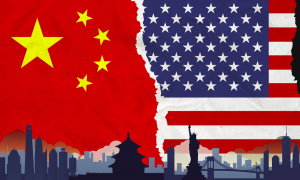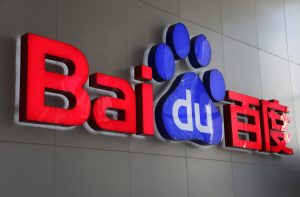The Divided Tech Landscape: U.S.-China Decoupling and the Rise of Generative AI
The race for dominance in the field of artificial intelligence (AI) intensifies as the U.S.-China decoupling shapes the tech landscape. One particular area gaining momentum is generative AI, which involves transforming text into various forms of content. China, in its quest to reduce dependence on U.S. technology, has been investing in its own large language models (LLMs). They aim to soon develop AI systems that rival OpenAI‘s GPT models. Baidu, the renowned Chinese tech giant that developed Ernie Bot, is leading the charge. The firm recently announced the launch of a billion yuan ($145 million) fund to support generative AI companies.
Also Read: The AI Arms Race: A Deadly Rivalry Between the USA and China

Baidu’s Billion Yuan Fund: Fostering Innovation in the AI Startup Ecosystem
During a JPMorgan summit in China, Baidu’s CEO, Robin Li, announced the company’s plans to actively invest in AI startups. With this fund, Baidu aims to provide financial backing and resources to promising generative AI ventures. This move by Baidu mirrors OpenAI’s Startup Fund, which started at $100 million and grew to $175 million over time. The fund can invest up to 10 million yuan (approximately $1.4 million) in each selected project. This surely demonstrates Baidu’s commitment to nurturing AI innovation.

Ernie Bot and the Rise of China’s Language Models
Baidu has been making significant strides in developing its own large language model, Ernie Bot. The company plans to leverage the fund to accelerate the adoption of Ernie Bot within the developer community. While American developers have been building applications based on models like ChatGPT, Baidu envisions a future where more Chinese developers build AI applications using Ernie as their foundation. Baidu’s CEO, Robin Li, expressed his confidence in China’s AI development, emphasizing the country’s knack for embracing new technologies and building innovative applications.
Also Read: Ernie Bot vs. ChatGPT: A Comparative Analysis of AI-Language Models
Balancing Robustness and Self-Reliance: China’s Homegrown Large Language Models
Despite China’s push for AI self-reliance, concerns linger about the robustness of its homegrown large language models (LLMs). The goal of developing these models is to ensure that China is not vulnerable to U.S. sanctions that could disrupt crucial technological supplies, as witnessed in the semiconductor industry. Apart from Baidu, other Chinese tech giants like Alibaba & Tencent are also actively working on their own large language models. This reflects the nation’s determination to establish a robust AI ecosystem.
Also Read: Alibaba and Huawei’s Announce Debut of Their Chatbots: The Rise of Generative AI Chatbots in China

Our Say
As China strives for AI self-reliance, Baidu’s billion yuan fund represents a significant step towards fostering innovation and nurturing the AI startup ecosystem. This major investment has catapulted China ahead of the U.S. in the AI race, making it less dependent on USA’s technology. Baidu aims to drive technological advancements in China by supporting generative AI companies and promoting the adoption of its own language model, Ernie Bot. However, the challenge lies in ensuring that China’s homegrown large language models can meet the demands of real-life scenarios. With Baidu, Alibaba, Tencent, and other tech giants investing in this field, China’s pursuit of AI dominance continues to gather momentum, reshaping the global tech landscape.




